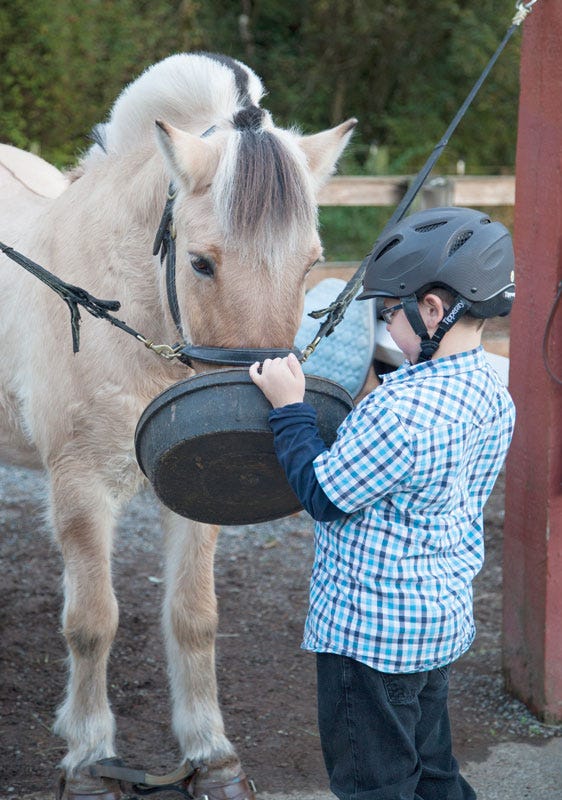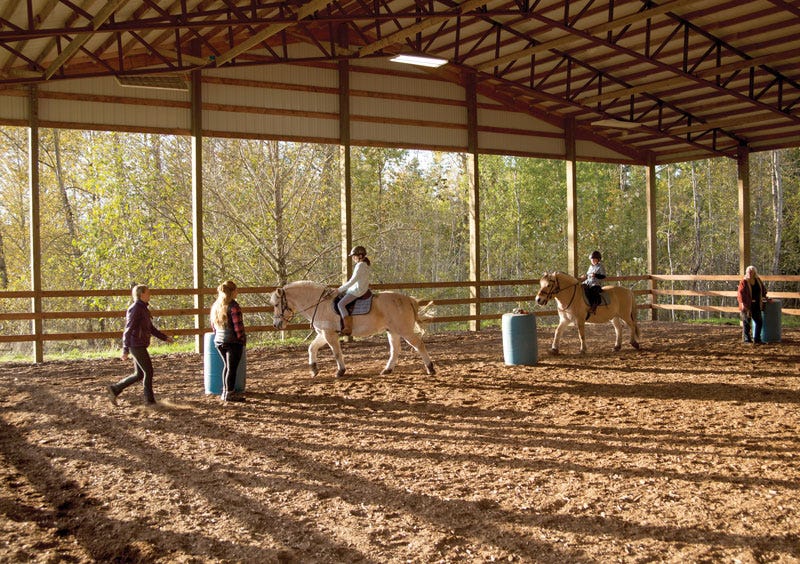Taking the Reins
Horseriding helps people gain confidence
STORY BY BRIANNE HEID
photos by Annmarie Kent
Pulling up the long gravel driveway, riders arrive for their weekly sessions with Julia Bozzo, director and creator of the Northwest Therapeutic Riding Center in Bellingham. As they walk past the modest yellow house where Julia and her husband reside, a friendly dog leads them to a covered arena behind the house. Rolling pastures surround the property as chickens and livestock chatter in the background.
This setting is a full-time job for Bozzo. Since opening the nonprofit in 1993, she and her husband have expanded the program from the original one rider and horse to the current program of seven horses and up to 100 sessions each year.
Therapeutic riding is good for brain development because it produces adrenaline, Bozzo says. People with disabilities may have less of an opportunity to experience these types of risk activities elsewhere.
“A lot of people with autism respond to pressure and rhythm. It also calms down the firing of the neurons and allows them to learn,” Bozzo says. “This is in addition to learning to ride the horse.”
Bozzo was born loving horses and has always been drawn to them, she says. She took lessons when she was a young girl and bought her first horse with money she earned from a paper route at the age of 12. Eventually, Bozzo studied animal science at graduate school and continued to pursue her passion for horses.

Joe, a young rider who was diagnosed with autism, has been attending the Northwest Therapeutic Riding Center for three years. His grandparents began taking him when he was 6 years old.
“This is one therapy that we see being good for him,” says Paulene Moa, Joe’s grandmother. “He has to pay attention and learn new things. It gives him a lot of confidence. He’s been waiting two long years to ride like he is now … that’s a wonderful thing.”
Moa says her grandson’s favorite thing to do at the riding center is to trot with his favorite horse Kurt. When Joe first started riding two years ago he had two spotters on each side and today he is riding by himself. Moa says the therapy has helped him overcome much of his disability with improved communication and direction.
Each lesson is tailored to individual riders, says 23-year-old volunteer Jordan Bennett. Therapeutic riding sessions are designed to help people with disabilities build confidence and horsemanship by creating a connection between humans and animals, while teaching responsibility.
“The thing about horseback riding is that it’s the only activity that simulates a human walk,” Bennett says. “Some of our riders can’t walk very well and when you put them on a horse they are getting that natural gate.”
Bennett, a Western student studying kinesiology, started her internship last June and has continued to volunteer in hopes of getting certified to become an instructor. She has always been drawn to horses and saw the riding center was a way to interact with them while helping others.
“I was looking for something where I could work with horses,” she says. “I have never been involved with therapeutic riding before this.”
Anybody can volunteer at the center, she says, even if someone has not had a lot of experience with horses.
He has to pay attention and learn new things. It gives him a lot of confidence. He’s been waiting two long years to ride like he is now…that’s a wonderful thing.
Throughout the year, instructors schedule seven weeklong sessions. Volunteers come three days a week to help the riders learn how to groom, mount and ride the horses around the arena. While riders generally come to the center with the intention to improve their disability, Bennett says the overall goal is to have fun.
Riders come to the center with a wide range of physical and mental disabilities, ranging from autism to hip problems.
“I think [horse therapy] is more holistic, meaning when you ride the movement of the horse goes through your whole body,” says Bozzo. “There is a connection with the whole animal and it encompasses many, many aspects of many, many therapies. For example, it can be good for your respiratory system.”
Bozzo believes horses’ abilities to help people with disabilities makes them some of the most amazing animals in the world, she says.

“I really enjoy putting together all the moving pieces in the organization — the volunteers, the horses, the riders, the families, the staff and the donors,” Bozzo says. “When everyone works together, we create life-changing experiences for members of our community.”
Bozzo’s main goal is for people to understand the value of the horse-human relationship.
To accomplish this goal she wakes up at 6 a.m. and begins her day feeding the horses, cleaning their stalls and preparing them for lessons. She recruits volunteers, prepares all the horses for the riders, answers emails, attends board meetings and tends to the horses for the evening. For Bozzo, there is always work to be done, but this is work she thoroughly enjoys.
As she leads the horses out of the arena and ends the day’s last lesson, the setting sun glows over the barn, leaving a sense of tranquility and calmness for riders and animals alike.
